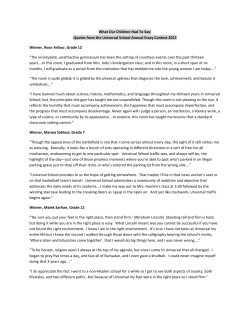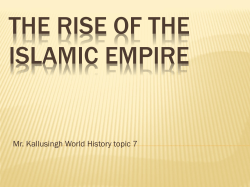
Majlis Ugama Islam Singapura Friday Sermon
Majlis Ugama Islam Singapura Friday Sermon 14 November 2014 / 21 Muharram 1436 Fiqh Aqaliyyat – Dealing with the Realities of Life Blessed Friday jemaah, Let us increase our takwa to Allah with utmost piety. Obey all of Allah’s commands and abstain from what Allah has prohibited upon us. Hold tight to the rope of Allah s.w.t. and Allah will strengthen the binds between humankind. Beloved jemaah, Let us reflect upon what was said by our beloved Rasulullah s.a.w. when he sent two of his companion to Yemen. The Prophet s.a.w. sent Mu’adz bin Jabal and Abu Musa al-Ash’ari 1 r.a. in the tenth year of Hijrah to call upon the people of Yemen to embrace Islam. Rasulullah s.a.w. said: Which means: “Make things easy for the people, and do not make it difficult for them, and make them calm (with glad tidings) and do not repel them (i.e. make them hate good deeds and run away from Islam).” [Hadith narrated by Imam Al-Bukhari and Muslim] Why did the Prophet s.a.w. say as such to the companions? What was the context to it? At that time, there were not many Muslims in Yemen because Islam had not been widely spread in Yemen. Thus, Rasulullah s.a.w. sent two companions who were experts in Islamic law and jurisprudence, to help spread the message of Islam there. If we were to understand carefully, his message to them actually contains the important guidelines in applying Islamic legal rulings in an environment where Muslims are the minority. If we study the hadith, we would realise that it is acknowledged that practicing Islam in a non-Muslim majority will experience a different set of challenges, as compared to a Muslim-majority country. The early scholars of Fiqh have often taken these factors into consideration, and this is apparent in the fatwas that they issued in the context of non-Muslim majority countries. 2 One example is when the Muslim empire lost control of Andalus. This branch of knowledge is known among Muslim scholars today as Fiqh an-Nawazil, or Fiqh Al-Aqalliyyat. Which means: Fiqh or Islamic jurisprudence for a community that lives as a minority. The basis of Fiqh Al-Aqalliyyat is the flexibility and applicability of Islamic laws at every place, time and context. This flexibility however does not in any way mean that Islam is taken lightly, belittled or even neglected. In fact, it means that the Syariah is enlivened through its applicarions in a diverse Muslim community. This characteristic is also the main factor as to why Islam can be practised anywhere and everywhere, and it is not limited to time and place. The prophet and the companions were sensitive towards the habits and customs of the communities outside Makkah and Madinah, and they took into consideration the surrounding environment. These were thea crucial factors in spreading the message of Islam and practising Islam. Hence, scholars have developed a Fiqh principle that takes into consideration the customs of the community, as long as they do not contradict the Quran and hadith, in determining the ruling of a certain issue. 3 Among the features of Fiqh Al-aqalliyyat are: First: Takes into consideration the differences and changes in place, time and context. The differences in Fiqh laws that were derived by the companions (Sahabah) and scholars of Fiqh in the past were largely due to this method. For example, every individual may face different circumstances and situation. Thus, a fatwa or Fiqh opinion issued in one country may not be applicable for another country because it is a different place, there is a different way of life and the context is different. Hence, we should be careful when we quote or refer to the fatwa issued in other countries. There is a possibility that the opinion was agreed upon due to a certain situation that happened in that country. And this happens often. For example, the fatwa issued in Singapore regarding in matters of buying and selling as well as inheritance takes into account the context of Singaporean society as well as the situation of the Muslim community here, and it may not be appropriate to be applied in a foreign country. Second: Understands the realities and living norms of a community. The application of a hukum or Islamic law is not simply limited to understanding evidences or proofs from the Quran and Sunnah, but also takes into account the living conditions and the realities faced by a community. 4 On that basis, when Rasulullah s.a.w. wanted to send Mu’az ibn Jabal r.a. to Yemen, he reminded Mu’az that he will be faced with a community that consists of people of the book (Ahlul Kitab). In the book of Syarah Umdatu Al-Ahkam, it was reported that the reminder from Nabi s.a.w. was actually a guidance for Mu’az, that his method in delivering the message of Islam to the people of Yemen will not be similar to that of the method in spreading the message of Islam to the people of Quraish in Makkah. This hadith emphasises the need to be mindful and to understand the norms and customs of a community. The third feature of Fiqh Al-Aqalliyyat is: Fiqh that gives ease (removed hardship). Again, making it easy does not mean taking a matter lightly or neglecting aspects of the faith, but it means giving guidance that will ease and provide a solution to those who facing any issues. In fact, the concept of “removing hardship” in delivering the message of Islam was practised by Rasulullah s.a.w. and the companions. The Syariah acknowledges the difficulties and challenges faced by Muslims, and in facing these difficulties, a solution that eases the situation is encouraged. 5 This is based on several verses of the Quran, on removing hardship to those who are faced with difficulties. One of these verses is verse 173 in Surah Al-Baqarah: Which means: “He has only forbidden to you dead animals, blood, the flesh of swine, and that which has been dedicated to other than Allah . But whoever is forced [by necessity], neither desiring [it] nor transgressing [its limit], there is no sin upon him. Indeed, Allah is Forgiving and Merciful.” Beloved Friday jemaah, Living in a multi-religious country, an understanding of Fiqh AlAqalliyyat and its features is crucial. It does not in any way weaken our religious practices nor cause or acts of worship to be rejected by Allah s.w.t., but will in fact be the contrary. This is because our ongoing efforts to continue leading our religious lives and enliven the Syiar of Islam will boost our religious resilience and our identity as Muslims. We will be able to live comfortably and confidently as part of a plural society of multireligious and multi-racial communities. At the same time, we are able to reflect the beauty of our religion, good akhlak and 6 character, calling upon others to enjoin in goodness with wisdom, and at the same time, holding true to Islamic principles. Jemaah, Let us strengthen our commitment to further efforts in deepening our knowledge of Islam, together with our beloved family members, and to increase our acts of worship. May Allah accept every step we take to lead our religious lives and may Allah be pleased with us. Amin Ya Rabbal Alamin. 7
© Copyright 2025
















